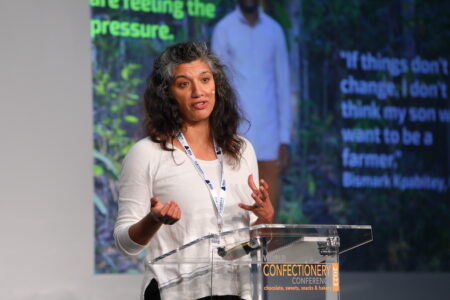Exclusive: The World Cocoa Conference: the sustainability journey continues

Antonie Fountain speaking at the World Cocoa Conference. Pic: Neill Barston
As Antonie Fountain asserted for the final session of the World Cocoa Conference, “All of us in cocoa are like Lord of the Rings’ Sam Gamgee – if we take one more step in our sustainability journey, we are further from home than we have ever been, because we have come so far already,” reports Neill Barston.
The managing director of the Voice Network sector organisation offered an inspired and striking keynote presentation to conclude an eventful three days for the major event held at the Square Meeting point in Brussels Belgium. (see our video review of the event here, featuring Antonine).
With more than 1,000 senior delegates from across the international cocoa and chocolate industry gathering for the 2024 edition, there was a palpable sense of expectation given the fact that the event, normally staged every two years, had not been held since 2018, owing to the pandemic.
Its core focus had been on ‘paying more for a sustainable cocoa,’ which included a total of more than a dozen industry panels that for the first time ever placed delivering a living income for farmers in the sector at the heart of the event.
Yesterday’s sessions concluded with Michel Arrion, executive director of the ICCO cocoa organisation which organised the event, reading its formal declaration of action (which will be formalised over the next few weeks).
This centred on joint commitments from participating companies and organisations in relation to a dedicated path of engaging with upcoming legislation governing deforestation and human rights contained within the EUDR regulations. It was confirmed at the conference that these legal frameworks were in fact on track to be delivered from the end of 2024, despite pushback from some quarters within the EU.

Critically, the latest World Cocoa Conference came amid the week that cocoa prices have continued to spike on Futures commodities markets in both New York and London, hitting a total of $12,000 a tonne, standing at five times the value of contracts that are presently being paid to farming cooperatives in Ghana and neighbouring Ivory Coast, even accounting for the 50% crop payment increase announced in both countries in the past few weeks.
For his part, Antonie Fountain offered an assessment of the sector’s handling of major issues including child labour linked to the industry and deforestation, observing that there had been significant strides made since the first World Cocoa conference assembled in 2012, where discussions on human rights for minors was not even on the agenda.
He began his presentation, titled “The Global Cocoa Agenda: A roadmap or dead end’ expressing a view that over twenty years observing the cocoa industry, reflecting on his work engaging with governments, civil society groups and farmers, he ‘felt both anger and courage’ in relation to the events of the past two decades and how he has sought to influence a positive direction of travel in tackling issues head on. More than anything, he asserted that the most important emotion to have in considering the cocoa industry is hope, that things can change for the better.

Significantly, he noted that the collaboration being seen between Ghana and Ivory Coast through the CIGCI organisation was particularly encouraging, and ‘something that would have been pretty unimaginable 12 years ago and a massive step forward,” also noting that NGO’s working towards implementing new legal regulations including the upcoming EUDUR could scarcely have been imagined in previous years.
Due diligence decision
He noted that he was hopeful that the industry would play its part in engaging with new European due diligence laws due to come into force over the next couple of years (which were in fact approved in Strasbourg yesterday afternoon) – despite facing opposition, they gained approval in a vote of 374 to 235 in favour. If these laws are finally adopted in an EU parliamentary session next month, it will compel larger businesses to ensure companies legally check for poor labour practices or environmental infringements.
However, while noting that there had been efforts to tackle child labour in particular, the Voice Network’s director sounded a note of alarm regarding the urgent need for companies to ensure that they are collectively fully transparent in handling their overall sustainability responsibilities.
He said: “There’s a lot of things we can be concerned about. There’s a really big issue that a lot of the private sector is all of a sudden trying to run away from being more honest about this. And I think that’s exactly the wrong way. I think we need to be more transparent. I also think that after this afternoon you’re going to have to be more transparent from a legal perspective.
“There’s challenges, but also possibilities there, and that’s something to be so hopeful for. If you look at the environment – this is actually on the agenda now. It was almost absent from the Global Cocoa Agenda 12 years ago, we weren’t talking about deforestation in cocoa or climate change then, or galamsey (illegal gold mining that has significantly impacted cocoa growing land in Ghana and Ivory Coast),” as he cited a story published this month highlighting the latter issue, which he noted was all vital in terms of overall transparency surrounding how the sector conducts itself and honing in on areas for direction action from the industry, governments and civil society combined.
In reference to the cocoa price spikes of the past year, he admitted that he is ‘terrified’ on the basis that at least some of the conditions that have caused the problem have ensured that farmers in both Ghana and Ivory Coast have suffered significantly this past year.
He continued: “What are the real challenges? We need an honesty about the scope and size of the problem before that scope and size of the problem becomes so big that we see our yields decrease drastically, we can’t just blame a weather pattern for what is happening in West Africa at the moment.
“There’s a lot of other problems underpinning that, that require a lot more transparency, and that transparency will then lead to actually effective policies to challenge the situation. Because in the words of Martin Luther King, there is a fierce urgency of now.”
In summing up, he commented that in his view, some of the key changes that are urgently required included enabling a de-commoditised cocoa sector that operated transparently and provided security for farmers.
He also added that greater professionalisation of the industry was required to help steer it through ongoing challenges, as well as making it more attractive for young people ‘be excited and want to go into cocoa’ to ensure the sector’s viability for future generations.
ILO industry ‘reality check’
Prior to Antonie Fountain’s appearance, yesterday’s morning session began with a guest appearance from Lieve Verboven (below), director of the International Labour Organisation office to the EU and Benelux countries.

She expressed concern that the cocoa industry needed ‘a reality check’ in terms of its performance in relation to delivering on key sustainability goals. Notably, she said that action from the sector has been ‘fragmented’ and not sufficient to deal with the scale of child labour.
As Confectionery Production has reported on numerous occasions, more than 1.5 million children in West Africa are still impacted by being vulnerable to the worst forms of child labour, including use of machetes for cocoa harvesting, as well as in some reported instances being expected to conduct heavy manual labour and operate pesticides.
With the smallholder based industry in West Africa’s structure as it predominantly stands, the majority of small farms operated by families cannot presently afford adult labourers, which has historically led to an over-reliance on young members of households due to poverty levels of income at well under $2 a day in many instances.
Final panel
The three-day event concluded with an eight-strong panel featuring Dr Jorge Rojas Rodriguez, the Ambassador of Colombia in Belgium, Luc Magloire Mbarga Atangana, the minister for trade, Cameroon and Guus de Gruiter, European Cocoa Association board member.
It also featured Aldo Cristiano, of Caobisco European confectionery trade organisation, which will be represented at our own World Confectionery Conference on 12 September, who asserted that the industry was fully engaged with finding sustainability solutions.

“We’re not running away from the legislation’ he said in relation to the upcoming EUDR frameworks that are now making their way through the EU parliament.
He added: “We have actively worked together with other stakeholders, and what has been decided will be finally put in place this afternoon. Why did we do this? We saw more opportunities in having a real level playing field.
“So, to turn these regulations into something that is working, there are still some questions on this. We have heard at the conference that the guidelines are still not ready – so we need to have clear understanding on this in order to continue our efforts in the right way and be proactively helping.
“Every supply chain starts with a traceability system, and we have seen that in some countries, such national systems are non existent. But we have seen in Ivory Coast and Ghana have voluntarily with the help of the EU and the industry bring about such traceability. We need to continue this with other countries on the same path, and we can offer our knowledge and experience to help enable them in this.”
- See extended coverage of the 2024 edition of the World Cocoa Conference in our next edition of Confectionery Production magazine.



